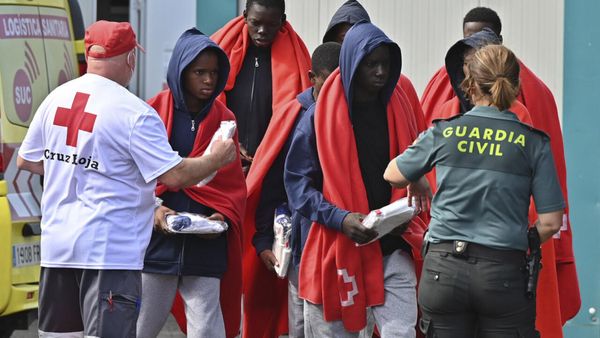
JERUSALEM — Israel’s military on Friday directed the evacuation of northern Gaza, a region that is home to 1.1 people, within 24 hours, a U.N. spokesman said.
The order, delivered to the U.N., comes as Israel presses an offensive against Hamas militants. U.N. spokesman Stéphane Dujarric called the order “impossible” without “devastating humanitarian consequences.”
This could signal an impending ground offensive, though the Israeli military has not yet confirmed such an appeal. On Thursday it said that although it was preparing, a decision has not yet been made.
The Israeli military pulverized the Gaza Strip with airstrikes, prepared for a possible ground invasion and said Thursday its complete siege of the territory — which has left Palestinians desperate for food, fuel and medicine — would remain in place until Hamas militants free some 150 hostages taken during a grisly weekend incursion.
A visit by Secretary of State Antony Blinken, along with shipments of U.S. weapons, offered a powerful green light to Israel to drive ahead with its retaliation in Gaza after Hamas’ deadly attack on civilians and soldiers, even as international aid groups warned of a worsening humanitarian crisis. Israel has halted deliveries of basic necessities and electricity to Gaza’s 2.3 million people and prevented entry of supplies from Egypt.
“Not a single electricity switch will be flipped on, not a single faucet will be turned on and not a single fuel truck will enter until the Israeli hostages are returned home,” Israeli Energy Minister Israel Katz said on social media.
Lt. Col. Richard Hecht, an Israeli military spokesman, told reporters Thursday that forces “are preparing for a ground maneuver” should political leaders order one.
A ground offensive in Gaza, which is ruled by Hamas and where the population is densely packed into a sliver of land only 25 miles long, would likely bring even higher casualties on both sides in brutal house-to-house fighting.
Hamas’ assault Saturday and smaller attacks since have killed more than 1,300 people in Israel, including 247 soldiers — a toll unseen in Israel for decades — and the ensuing Israeli bombardment has killed more than 1,530 people in Gaza, according to authorities on both sides. Israel says roughly 1,500 Hamas militants were killed inside Israel, and that hundreds of the dead in Gaza are Hamas members. Thousands have been wounded on both sides.
As Israel pounds Gaza from the air, Hamas militants have fired thousands of rockets into Israel. Amid concerns that the fighting could spread in the region, Syrian state media reported that Israeli airstrikes on Thursday put two Syrian international airports out of service.
The relentless barrage on Gaza — which the military said has so far involved 6,000 munitions — left Palestinians running through streets, carrying their belongings and looking for safety
A strike Thursday afternoon in the Jabaliya refugee camp took down a residential building on families sheltering inside, killing at least 45 people, Gaza’s Interior Ministry said. At least 23 of the dead were under the age of 18, including a month-old child, according to a list of the casualties.
The home belonging to the al-Shihab family was packed with relatives who had fled bombing in other areas. Neighbors said a second house was hit at the same time, but the toll was not immediately known. The Israeli military did not immediately respond to a request for comment.
“We can’t flee because anywhere you go, you are bombed,” one neighbor, Khalil Abu Yahia, said. “You need a miracle to survive here.”
The number of people forced from their homes by the airstrikes soared 25% in a day, reaching 423,000 out of a population of 2.3 million, the U.N. said Thursday. Most crowded into U.N.-run schools.
Families were cutting down to one meal a day, said Rami Swailem, a 34-year-old lecturer at al-Azhar University, who had 32 relatives sheltering in his home. Water stopped coming to the building two days ago, and they have rationed what’s left in a tank on the roof.
Alaa Younis Abuel-Omrain has been staying in a U.N. school after a strike on her home killed eight members of her family — her mother, aunt, a sister, a brother and his wife and their three children. Most bakeries stopped producing bread for lack of electricity.
“Even if there is food in some areas, we can’t get to it because of strikes,” she said.
On Wednesday, Gaza’s only power station ran out of fuel and shut down, leaving only lights powered by scattered private generators.







